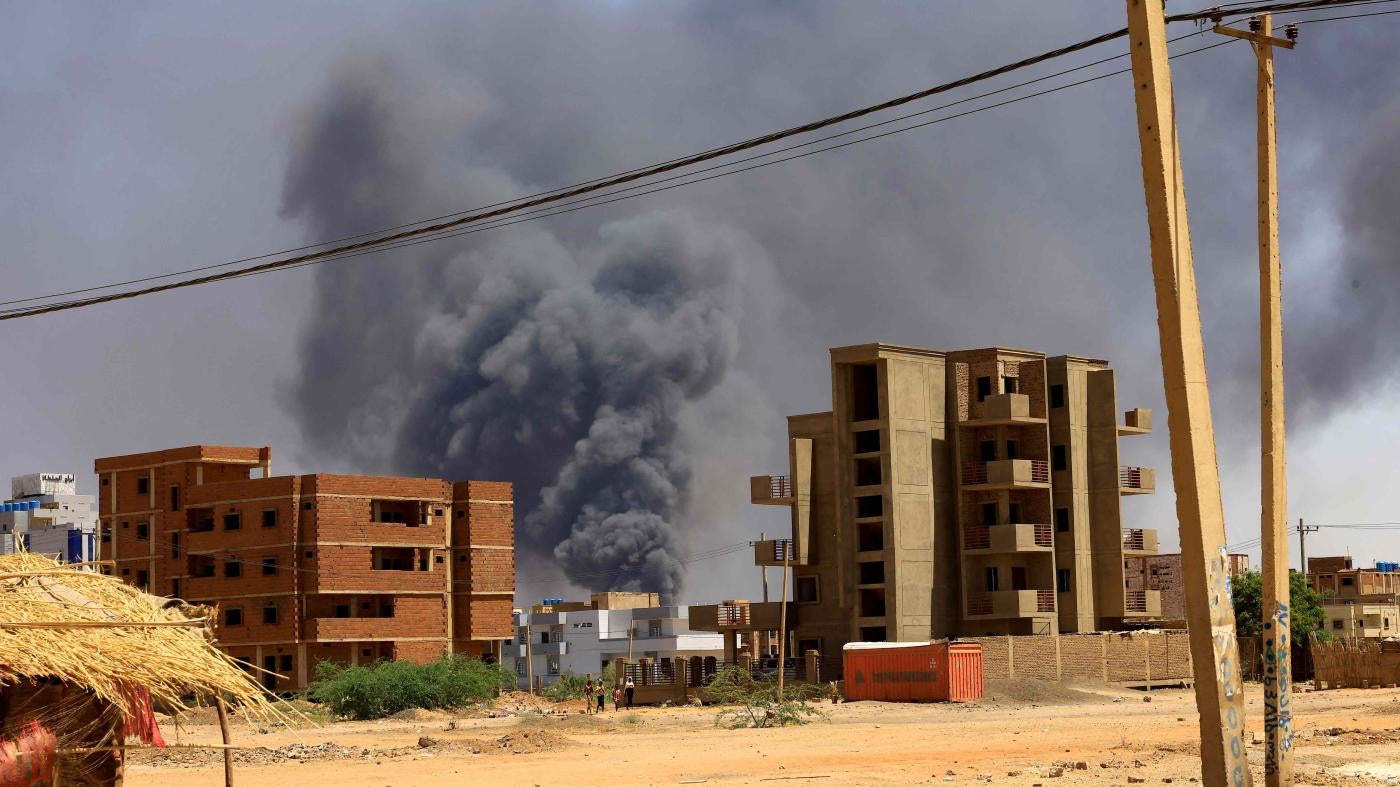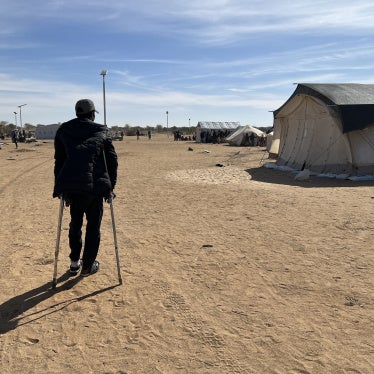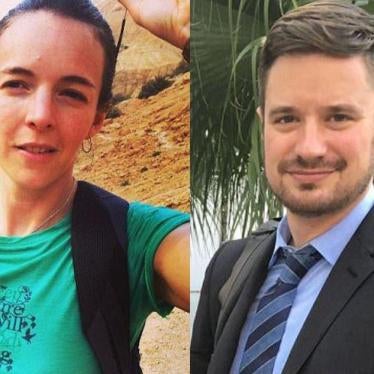In April, an armed conflict broke out after two of Sudan’s most powerful generals – who jointly overthrew a transitional government in a 2021 coup – began battling for power. The country’s military, the Sudan Armed Forces (SAF), and the Rapid Support Forces (RSF), an independent armed force, have over the last two months caused massive destruction and harmed people throughout the country. Hundreds of civilians have been killed, and over a million have been forced to flee mainly internally but also abroad, creating a humanitarian disaster. Over 88,000 have so far fled into South Sudan, many of whom were living in the capital, Khartoum, and were South Sudanese nationals, Sudanese, or refugees from the region.
Anthony Gale speaks with Laetitia Bader about what she learned while undertaking her research and what more needs to be done to support those affected by this conflict.
What were your first impressions of the refugees you spoke with in Juba?
The first impression I got was of a community in shock. The trauma is almost palpable.
While some said they had started to store food and water before the fighting broke out in Khartoum, as they saw the situation rapidly deteriorating, many more were taken by surprise. It was disquieting to hear the very mundane, relatable stories of everyday life suddenly being shattered by conflict.
There is a sense of disbelief and dismay among those arriving in Juba. Not just because of the hardships they are facing, but also because of the incredibly difficult decisions they have had to make to get there. I spoke to numerous people who had been forced to leave loved ones behind – because they couldn’t afford to flee, because they were physically unable to, or because they felt they had to protect their homes back in Khartoum. Many of those I spoke to were tormented, not knowing whether their loved ones were safe.
A number of interviewees were from Darfur. They already had to flee their homes once, sometimes twice, as a result of fighting and serious abuses in Darfur and had seen Khartoum as a haven. Several asked me whether restarting their lives again would all be in vain.
But alongside the deep sadness and trauma of what they have been through, they are also having to come to terms with a very difficult and unsettling new reality. Many of the people arriving in Juba, including South Sudanese nationals, don’t know the city and don’t have support networks. A lot of people said they felt very alone.
What abuses in Sudan are you hearing about?
Many people I spoke to had a story of a relative, friend, or a neighbor who had been killed during the first weeks of fighting in Khartoum by gunfire or the heavy weaponry being used.
While some of this fighting, particularly in the wealthier parts of town, has been reported on by the media, there has been far less reporting about poorer neighborhoods that have also been devastated. The use of heavy weaponry, including air-dropped bombs, artillery, and tank fire, has had a massive and devastating impact on the civilian population and their ability to survive in Khartoum.
These stories were harrowing. A young man recounted to me in tears how he woke to find his beloved uncle dead in the room next to him after a munition hit the roof of their house; another 26-year-old man who saw tank fire hit a neighbor’s house and then rushed there to find two young children and their mum dead; and a woman who found her brother-in-law fatally shot outside their house after hours of fighting – he had just gone out to brush his teeth when the shooting started.
Widespread looting and theft by warring parties, notably the RSF, but also armed gangs or unidentified assailants, is also common. Several interviewees said that it was seeing their local market pillaged that made them realize they just wouldn’t be able to survive in Khartoum any longer and ultimately pushed them to flee. Many had had their personal possessions stolen. Some had their homes looted or saw wealthier neighbors’ homes pillaged, while others had their money and mobile phones stolen at checkpoints.
The impact of this looting is twofold; many refugees find themselves with little more than the clothes on their back and had to repeatedly borrow from friends or relatives to reach safety. But this will also make it incredibly difficult for them to rebuild their lives, either in South Sudan or if and when they are able to return to Sudan. When you factor in how little support is available to refugees in Juba, the situation is incredibly stark.
There have been concerns raised about sexual violence in this conflict. Is this something you came across during your research?
We looked into sexual violence and were hearing more and more reports from people trying to help survivors. But even the women coming forward are likely just a small sample of a much larger issue.
One of the problems is that survivors of sexual violence are likely to be hampered in their access to services right now – the fighting makes movement in Khartoum very dangerous. Many health facilities have been destroyed or been forced to close down, and medical supplies have been looted. Even those who can reach clinics find there aren’t enough services available to support survivors of sexual violence. I heard from several people that there are concerns about the shortages of PEP (post-exposure prophylaxis) which is provided to victims of sexual assault to stop them contracting HIV.
What is the situation like for refugees in Juba? Are they getting sufficient support?
Humanitarian aid agencies have in recent weeks scaled up support for the thousands fleeing into South Sudan. The government is allowing immediate emergency assistance to be provided in areas of arrival, but it wants those arriving to move onwards, either to go to refugee camps or, in the case of South Sudanese nationals, to go “home” to their areas of origin. For many, these are just not options; some of the returnees for example have always lived in Sudan, and others have chronic health conditions that require ongoing access to care that was only available in Khartoum.
Many of those I interviewed had made their way to Juba via the oil town of Paloich – where they described waiting, some for days on end, with no shelter, and very limited food and water. The health conditions were dire; several parents said their children fell very ill. A number of the interviewees said South Sudanese security personnel beat them as they desperately tried to board flights to Juba. It is important to underscore that the humanitarian situation in South Sudan was poor even before the conflict broke out in Sudan. The needs are enormous and gaps in funding significant.
Some of the Sudanese refugees and South Sudanese returnees I spoke with in Juba asked me where they could get support, who was going to help them? It was a recurring theme in my interviews and people were visibly very worried. There is currently little to no support for those fleeing into the capital.
The situation is particularly acute for Eritreans who had originally fled Eritrea and settled in Sudan and tried to flee to South Sudan when fighting broke out in Khartoum. I had several alarming phone calls from Eritreans who had managed to flee from Sudan to Juba but were told by the South Sudanese authorities that they couldn’t stay in Juba and were sent back towards the border. They are terrified they might be forced back to Eritrea, which has an extremely repressive government.
I’ve read that the communication network is shaky and has made getting information out of Sudan difficult.
Undoubtedly. The fighting has damaged Sudan’s communications infrastructure and fuel shortages are also having an impact. We know that in parts of Darfur in particular the communication network has been down.
In Khartoum, doctors’ groups are playing a critical role in providing information on casualty figures and the devastating impact of the fighting on the healthcare system, but they have warned this is most likely just a snapshot. This is the sense I got from speaking to refugees. A lot of people aren’t being accounted for in these numbers: family members hurriedly buried where they fell, and parents who don’t want to risk taking their injured child to the hospital. And of course, this is playing into the hands of the warring parties. The less information there is, the less scrutiny to which they are subjected.
Alongside the technical challenges of getting information out of Sudan, we are also seeing attempts to silence critical voices. We are receiving reports of civilians, including members of the local social movement known as “Resistance Committees,” and doctors being targeted by the authorities for raising awareness about the situation in Sudan. Just this week, military intelligence detained a prominent surgeon and activist, Dr. Alaa Nugud.
The authorities and warring parties need to allow monitoring, reporting, and criticism of their conduct. They should start by releasing Dr. Alaa and others arrested for expressing their peaceful views.
Was there a particular story you heard in Juba that has stayed with you?
I doubt I will forget any of the stories I heard, but there was one story that felt layered with so much devastation and tragedy.
It’s the story told to me by a man in Juba whose wife and their twin boy and girl, age 4, were living in Khartoum. On the day before fighting broke out, their son went to a wedding with his aunt. When they hadn’t returned the following day, and despite the fighting raging around her, the man’s wife went out to look for them and she got wounded twice. She spent three days in the hospital.
As soon as she was discharged, she went to look for her son and sister again. She found both their bodies.
With the help of a stranger, she buried them where they fell.
The man told me he pleaded with his wife to bring their daughter to Juba where they would both be safe. It took her a week, but she finally arrived on the border with South Sudan. Along the way, their daughter became gravely ill. His wife tried to get help at the border town of Renk, but the services were overwhelmed by the massive influx of refugees. She didn’t know what to do.
She told her husband that if she stayed at the border their daughter would die. Despite being so close to relative safety, she felt she had no choice but to turn back. She risked her life to return to a war zone because she believed her daughter would have a better chance of being treated in Khartoum.
A small mercy is that the daughter recovered, but both mother and daughter are now stuck in Khartoum and the father is tormented with worry.
This is just one of hundreds, if not thousands, of heartbreaking and avoidable tragedies that this conflict has created.
What would you like to see the international community doing?
On June 2, the UN Security Council is meeting to discuss the situation in Sudan and the renewal of the UN mission in Sudan. The UN has been focused on the political process at the expense of addressing the increasingly dire situation facing communities in Darfur and other peripheries.
The Security Council, with support of the three African countries currently on the Security Council, and the African Union should take this opportunity to spell out to the warring parties the consequences for their violating international law, especially attacks on civilians, civilian infrastructure, and medical facilities, as well as impeding or blocking humanitarian access.
Another important step would be to address the use of heavy weapons such as rockets, aerial bombs, and artillery, which are having a devastating impact on civilians. One way of doing this would be to limit the warring parties’ access to these weapons. Expanding the current arms embargo in Darfur region to the whole country would be a concrete step the UN could take to protect civilians. For this to be effective, African states need to back this call.
Finally, international donors should significantly increase humanitarian support both in Sudan and in neighboring countries to help ensure civilians fleeing from there and communities receiving them can get the help, and respite, they so desperately need.
*This interview has been edited and condensed.




